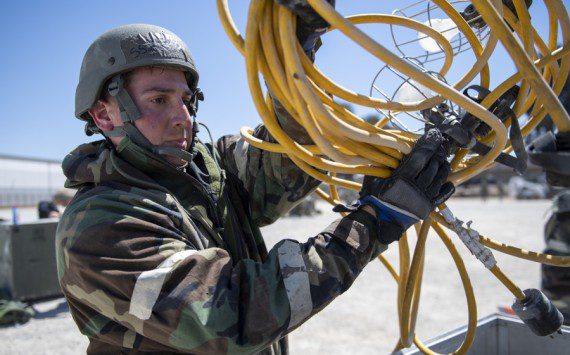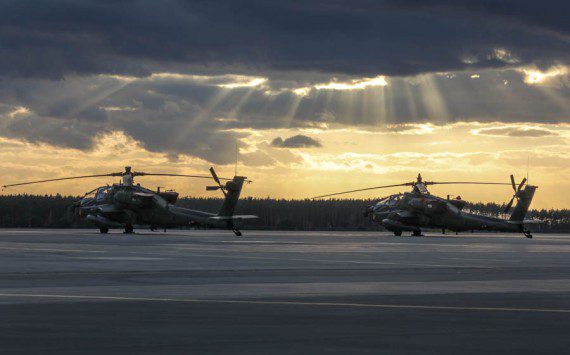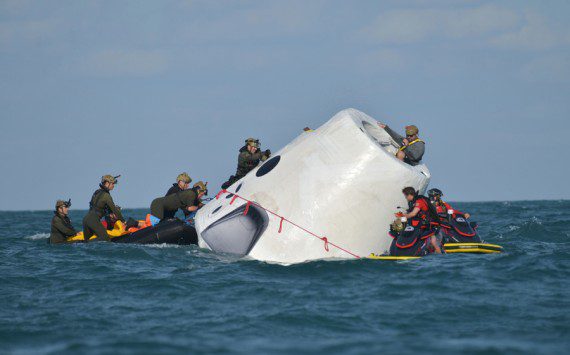Canada to increase Iraq trainers, but will remove jets
Canada will send more military trainers to Iraq but remains committed to removing its fighter jets from the country, Prime Minister Justin Trudeau said Nov. 17, sticking with his campaign pledges for the region despite the Paris attacks.
He added that he stands by his goal of bringing in 25,000 Syrian refugees by the end of the year despite mounting domestic pressure to reevaluate the plan.
Canada has had 69 special forces soldiers with Kurdish Peshmerga fighters since last year. Trudeau said details on how many more will be deployed and their exact role still need to be decided.
“I’ve committed repeatedly to my allies that we were going to do more on the training front and that means obviously more than just 69 trainers,” Trudeau told reporters on a plane as he headed from the G-20 Summit in Turkey to the Asia Pacific Economic Co-operation gathering in the Philippines.
“How many that will be, what form that will take, what kind of engagement we’re going to have, those are things that we’re going to work out,” he added.
Former Prime Minister Stephen Harper sent Canadian soldiers to help train Kurdish fighters in September last year in a mission billed as noncombat. But the troops have been training on the front lines and directing airstrikes, stirring controversy. A Canadian soldier was killed in a friendly fire incident.
The mission against the Islamic State Group includes six CF-18 fighter jets, a refueling tanker aircraft, two surveillance planes and one airlift aircraft, but Trudeau reiterated he will remove the fighter jets.
Trudeau also said he won’t back down from a pledge to bring 25,000 Syrian refugees to Canada by the end of the year, in the face of mounting criticism from the premiers of Quebec and Saskatchewan provinces, as well as some mayors.
“It didn’t take the tragedies of Paris for us to suddenly realize that security is important,” said Trudeau, adding that he is “very much committed to keeping Canadians safe while we do the right thing to engage responsibly with this humanitarian crisis.”
Harper declined to resettle more Syrian refugees despite the haunting image of a drowned 3-year-old’s body washed up on a Turkish beach after his extended family’s failed attempt to immigrate to Canada. Critics have questioned whether Trudeau’s goal is realistic.
Trudeau is scheduled to meet with President Barack Obama on the sidelines of APEC on Thursday. He said they will have a lot to agree on.
“One of the things I pointed out in our very first conversation on the phone was his focus on getting big things done in his final year,” Trudeau said. “Looking at legacy dovetails nicely with my desire to get big things done off the bat, in my first year, to set the tone for the coming years.” AP
Putin: Russian ship to cooperate with France in Syria
Russian President Vladimir Putin Nov. 17 ordered the Russian missile cruiser Moskva, currently in the Mediterranean, to start cooperating with the French military on operations in Syria.
Putin’s statement came as Russia’s defense minister said its warplanes have fired cruise missiles on militant positions in Syria’s Idlib and Aleppo provinces. The militant group Islamic State has positions in Aleppo province, whereas Idlib has the presence of the Nusra militant group.
Putin said a French aircraft carrier task force is to approach the Moskva soon and the cruiser is to “cooperate with them as with allies.”
Defense Minister Sergei Shoigu also told a briefing conducted for Putin on Tuesday that Russian bombers hit Islamic State positions in Raqqa and Der-ez-Zor.
Shoigu said the cruise missiles that hit the Aleppo and Idlib positions were fired from Tu-160 and Tu-95 warplanes. AP
Tokyo sues Okinawa in U.S. base relocation dispute
The Japanese government took the local government in Okinawa to court Nov. 17, launching a legal battle in their longstanding dispute over the planned relocation of a U.S. military air base on the southern island.
The lawsuit seeks to overturn Okinawa Gov. Takeshi Onaga’s recent decision to cancel an earlier approval for land reclamation for the base’s relocation.
The long-stalled plan would move the U.S. Marine Air Station Futenma from a densely populated neighborhood to Henoko Bay, a less-populated part of Okinawa, but many residents want the base moved out of the prefecture entirely. They feel Okinawa bears an unfair burden of the U.S. military presence in Japan. The prefecture houses more than half of the 50,000 American troops stationed in Japan and U.S. bases occupy nearly a fifth of the land on its main island.
“The central government’s one-sided imposition of the burden of (American) bases on us clearly discriminates against Okinawa,” Onaga told reporters. He said the central government’s action is “incomprehensible” to many Okinawan residents and that “I will make the case in court that our position is valid.”
The hearing is to begin next month.
Mike Mochizuki, a Georgetown University professor of political science and international affairs, said Onaga’s anti-base stance has made residents of Okinawa, a southern island with a distinct culture, more aware of their identify.
“The more the Japanese government pushes on the current Henoko plan, the more resistance will get stronger, and eventually it may get so strong and that it might become so broad that it would make it difficult for us to maintain other important facilities on Okinawa,” he said.
Onaga’s predecessor approved the land reclamation, but then lost to him in a re-election bid. The central government sued Okinawa after Onaga refused to follow an order from the Ministry of Land, Infrastructure, Transport and Tourism to reinstate approval for the work.
Land and transport minister Keiichi Ishii said Okinawa’s resistance only prolongs Futenma’s risk to its current neighborhood and prevents Japan from keeping its diplomatic promise to the U.S.
Tokyo briefly suspended the reclamation work earlier this year while seeking a compromise but has since resumed it. AP
In signal to China, Obama to give two ships to Philippines
With a towering warship behind him, President Barack Obama says the U.S. will hand over two ships to the Philippine Navy to boost its maritime security capabilities, in a bid to show the U.S. and its allies won’t be cowed by China in disputed waters far off its coast.
Obama says the pair of ships — one U.S. Coast Guard cutter, one research vessel — were part of a broader American plan to scale up assistance to naval forces in Southeast Asia. Coastal nations in the region feel threatened by China’s aggressive moves to assert control over the South China Sea.
Obama says the U.S. has an “ironclad commitment” to the Philippines — a U.S. treaty ally — and a mutual commitment to free and safe navigation at sea. AP
Deal at UN meeting opens way for satellite tracking of jets
Motivated by the mystery disappearance of a Malaysia Airlines jetliner last year, nations have set aside radio frequencies so that airplanes can be tracked by satellite — not just from the ground.
The agreement to set aside the frequency 1087.7-1092.3 MHz band in essence paves the way for planes that already send signals to ground stations to direct those signals toward space too.
The accord was announced Nov. 18 at a Geneva conference organized by U.N. communications agency ITU. Civil aviation regulator ICAO has expressed support for the idea, as long as current safety measures aren’t jeopardized.
The March 2014 disappearance of Malaysia Airlines flight 370 with 239 people on board exposed weaknesses in worldwide air navigation systems. Debris from the Boeing 777 was found in the Indian Ocean in July. AP











